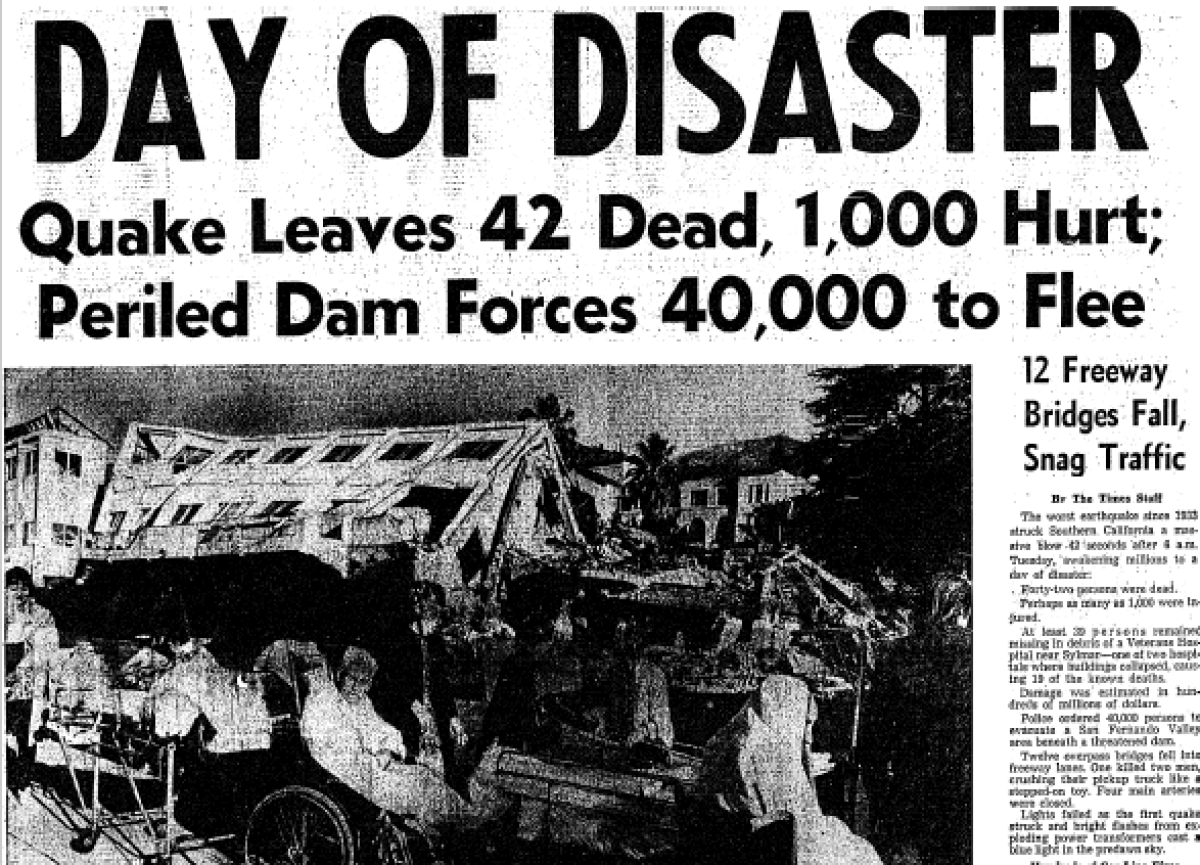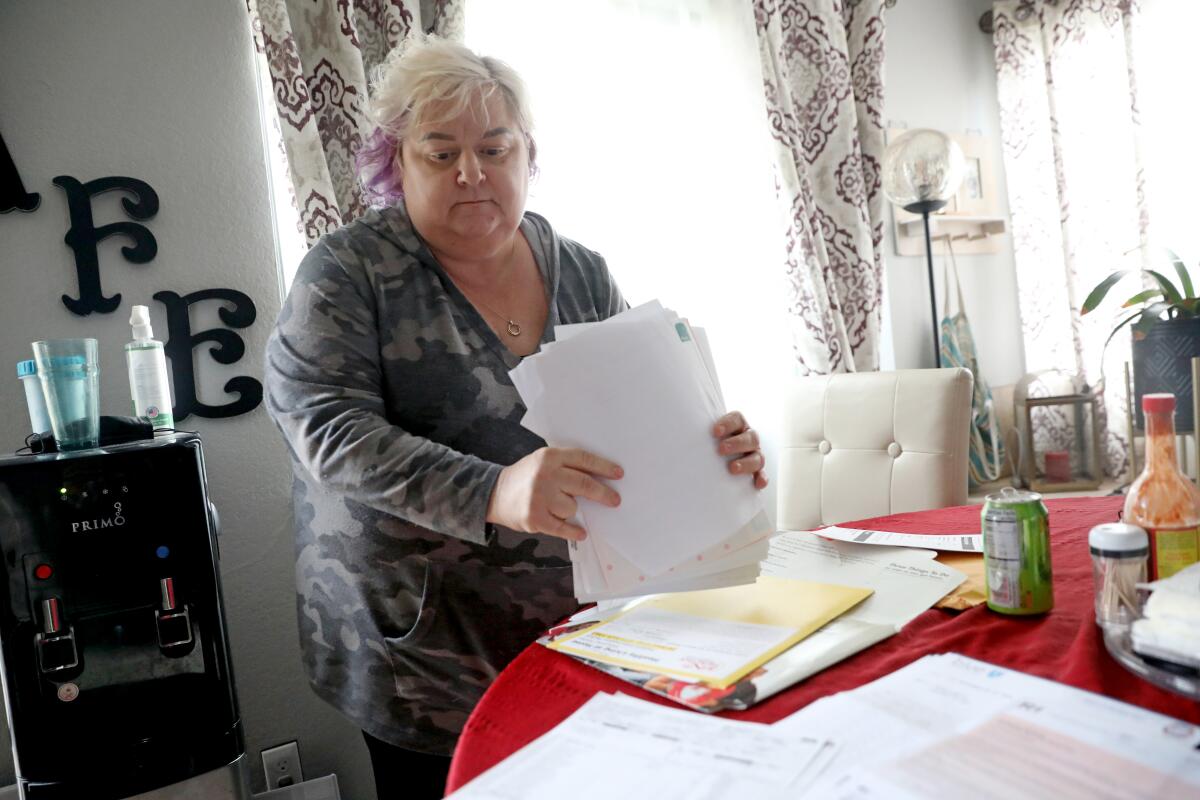Essential California: The earthquake that changed the state

- Share via
Good morning, and welcome to the Essential California newsletter. It’s Tuesday, Feb. 9, and I’m writing from Los Angeles.
Sign up for Essential California
The most important California stories and recommendations in your inbox every morning.
You may occasionally receive promotional content from the Los Angeles Times.
For the record:
9:00 a.m. Feb. 9, 2021The Loma Prieta earthquake was in 1989, not 1984.
Fifty years ago this morning, millions of people were violently jolted awake just after 6 a.m.
For 12 savage seconds, the ground shook. Overpass bridges tumbled into freeway lanes. Hospitals crumbled. The San Gabriel Mountains lurched several feet south. It was a shock and terror so immense that not all victims were felled by physical destruction — eight of the 64 deaths attributed to Sylmar earthquake were caused by heart attacks. Parts of the northeast San Fernando Valley resembled a war zone.
The first quake was over before the clock hit 6:01 on Feb. 9, 1971, though the aftershocks would continue for years to come.
As my colleague Doug Smith writes, the Sylmar earthquake “managed to wake California up to a danger that was largely unrecognized.”
[Read the story: “50 years ago, the Sylmar earthquake shook L.A., and nothing’s been the same since” in the Los Angeles Times]
The magnitude 6.6 Sylmar earthquake was not the proverbial Big One. But that catastrophic February day served as a catalyst for our modern era of earthquake awareness and preparedness, ushering in new earthquake legislation, programs and building code standards.
Doug (who began his career at The Times just a few months before the Sylmar quake) examines the earthquake’s legacy. His story also looks at how much worse the disaster could have been, had the Lower Van Norman Dam near Granada Hills collapsed, potentially killing tens of thousands of people. The catastrophic questions of what could have been had a galvanizing effect on lawmakers.
As Doug reports, the California Legislature responded with laws championed by state Sen. Alfred E. Alquist that required earthquake zones to be mapped and set new design standards for hospitals, and Congress created the National Earthquake Hazard Reduction Program several years later.
The political aftershocks of the Sylmar earthquake — and the ensuing preparedness and safety measures — allowed Californians to weather the 1989 Loma Prieta and 1994 Northridge earthquakes with far less damage, according to earthquake expert Lucy Jones.
“This earthquake in particular, as sort of the first one after Los Angeles had really become a major city, it highlighted a lot of problems that did end up being addressed,” Jones said in a recent Sylmar earthquake-focused episode of her podcast “Getting Through It.”
In an interesting footnote, the aftereffects of the Sylmar earthquake also forged a career path for the state’s foremost earthquake authority. Jones said that her doctoral work — as well as the U.S. Geological Survey job she held for most of her career — were funded through that same earthquake hazard reduction program created by Congress in the late 1970s.
And now, here’s what’s happening across California:
In Los Angeles, Latino and Black seniors fall behind in COVID-19 vaccine access compared with whites: The data raised new concerns about inequity in the troubled rollout of vaccines for those 65 and older and added pressure on county leaders to do a better job of getting communities of color immunized.
Only 7% of Black residents 65 and older have received at least one dose of the COVID-19 vaccine, the lowest percentage of any racial and ethnic group and less than half the comparable figure for white senior residents. About 9% of Native American seniors and 14% of Latino seniors have received at least one dose. By contrast, 17% of white senior residents have received at least one shot, as have 18% of Asian American and 29% of Native Hawaiian/Pacific Islander seniors. Los Angeles Times
Note: Some of the sites we link to may limit the number of stories you can access without subscribing.
L.A. STORIES
There is no vaccine for arts organizations struggling to survive 11 months into a debilitating pandemic, but the Mike Kelley Foundation for the Arts is offering what it hopes will be an injection of relief for 18 L.A. arts groups.Los Angeles Times
Support our journalism
POLITICS AND GOVERNMENT
House Democrats propose $1,400 payments in the first draft of a COVID-19 relief bill: The House Ways and Means Committee’s draft measures would send $1,400 payments to individuals earning up to $75,000 or couples making $150,000. If approved, the bill would also send $1,400 payments to adult and child dependents in households that qualify. Los Angeles Times
Protesters threw rocks at Sacramento Mayor Darrell Steinberg’s home and repeatedly shouted his children’s names in what Steinberg called an “attack” on his family and his community. Activists gathered at Steinberg’s home on Saturday to protest the city’s handling of homelessness during the pandemic. Sacramento Bee
CRIME AND COURTS
“It’s a showdown.” California district attorneys battle over criminal justice reforms. George Gascón announced a slew of policy changes when he took the helm of the L.A. County district attorney’s office in December. The news instigated a brawl among California’s public prosecutors, with the organization representing 57 out of the state’s 58 district attorneys questioning the legality and wisdom of Gascón’s mandates. Now, many of the state’s old guard of district attorneys are openly sparring with reformer colleagues in a power struggle that could shape criminal justice in California and other states. Los Angeles Times
[See also: “Several of D.A. George Gascón’s reforms blocked by L.A. County judge” in the Los Angeles Times]
Oakland police have arrested a man suspected of assaulting three people in a string of brazen, seemingly unprovoked attacks that set the city’s Chinatown on edge. The attack of a 91-year-old man was captured on surveillance video. Los Angeles Times
HEALTH AND THE ENVIRONMENT
Her COVID-19 treatment cost more than $1 million. Who’s going to pay for it? Los Angeles Times

U.K. variant of the coronavirus spreads in California, sparking new concern. Officials predict the B.1.1.7 variant will become the dominant coronavirus nationwide by the end of March. Los Angeles Times
As alcohol abuse rises amid the pandemic, hospitals see a wave of deadly liver disease: UCLA, USC and hospitals nationwide are treating more patients for alcoholic hepatitis, cirrhosis and other conditions amid COVID-19 shutdowns. California Healthline
CALIFORNIA CULTURE
A beautiful obituary for Luther Girado, the last male native speaker of the Nuwä language. Girado spent the last 20 years of his life sharing the ancient language and lifeways of the Nuwä (or Kawaiisu) people, who are indigenous to the Tehachapi and Paiute Mountain areas of Kern County. Tehachapi News
Anywhere but here: Comedian Megan Koester details teenage years spent itching to get the hell out of her Central California hometown in this vivid (and profanity-laced) essay. Exclusive Content
A poem to start your Tuesday: “There Are Birds Here” by Jamaal May. Poetry Foundation
Free online games
Get our free daily crossword puzzle, sudoku, word search and arcade games in our new game center at latimes.com/games.
CALIFORNIA ALMANAC
Los Angeles: partly sunny, 62. San Diego: cloudy, 61. San Francisco: cloudy, 55. San Jose: cloudy, 61. Fresno: cloudy, 66. Sacramento: cloudy, 63.
AND FINALLY
Today’s California memory comes from Gail Mathews
I woke up early on Feb. 9, 1971. Brushing my teeth in my parents’ Granada Hills ranch house, thinking about classes I had that day at L.A. Pierce Jr. College, I suddenly panicked. An unearthly roar came out of nowhere, the walls were shaking, the tile floors looked like waves. I grabbed a doorframe and yelled, “Earthquake.” My mother, brother and I stumbled down the hallway to the living room. The shaking seemed to last forever. Telephone service was interrupted. It was hours before we found out that my dad was safely at work in Burbank.
If you have a memory or story about the Golden State, share it with us. (Please keep your story to 100 words.)
Please let us know what we can do to make this newsletter more useful to you. Send comments, complaints, ideas and unrelated book recommendations to Julia Wick. Follow her on Twitter @Sherlyholmes.
Sign up for Essential California
The most important California stories and recommendations in your inbox every morning.
You may occasionally receive promotional content from the Los Angeles Times.




